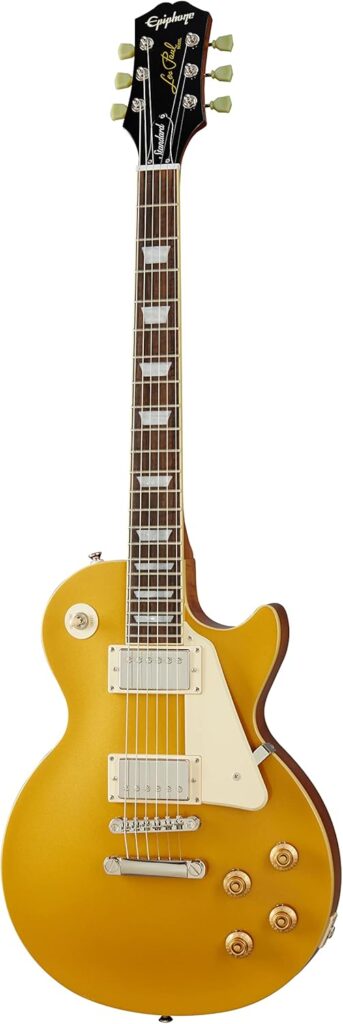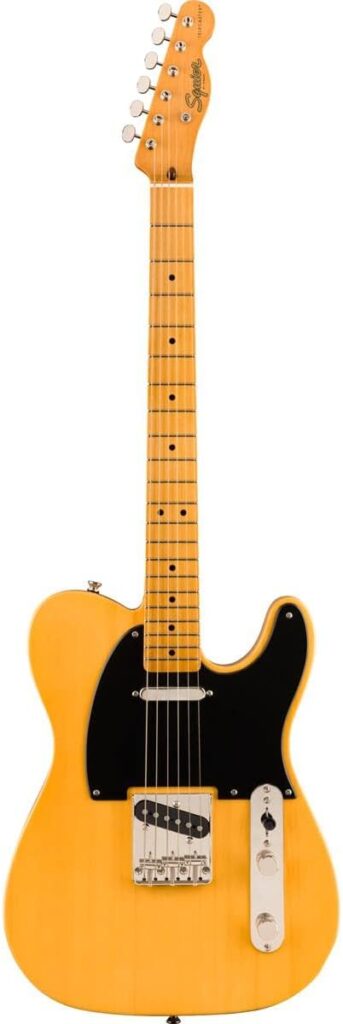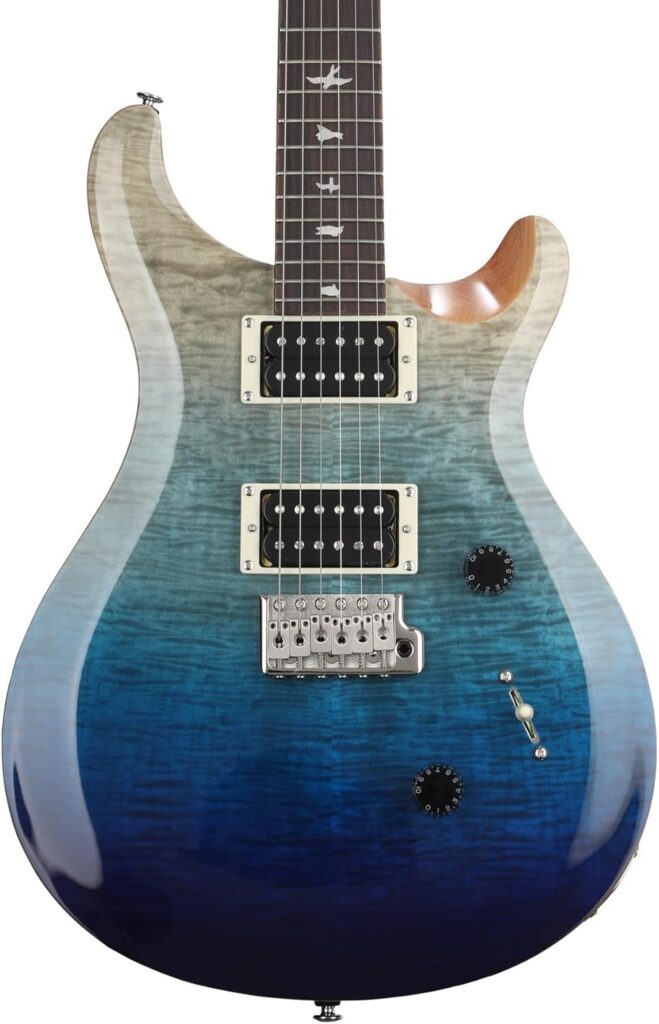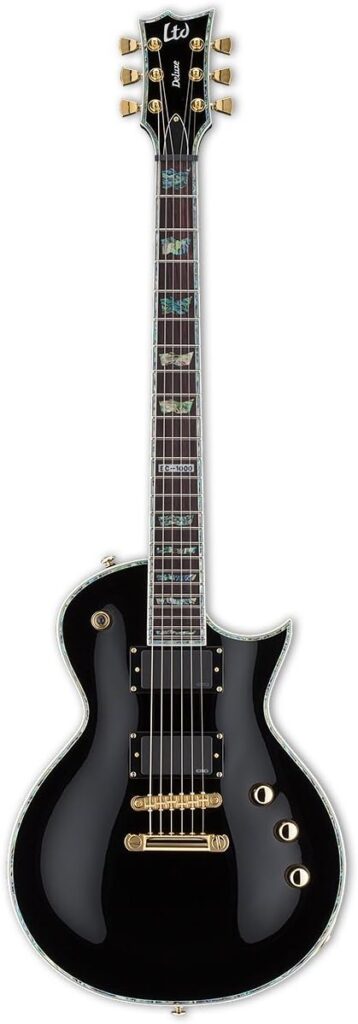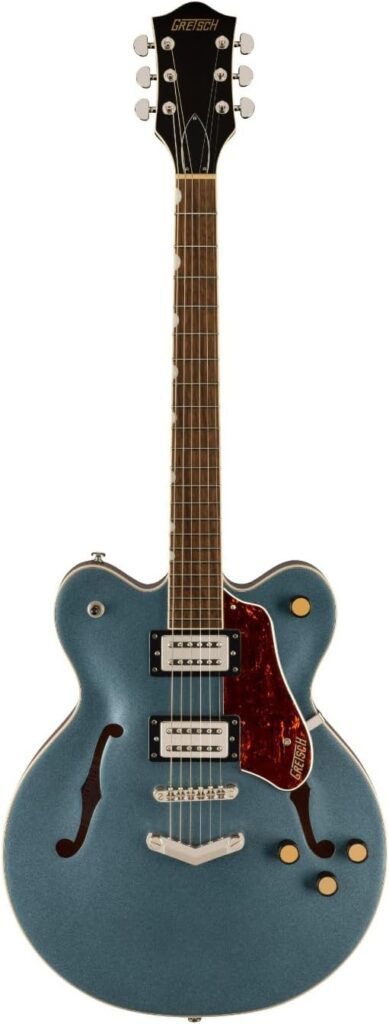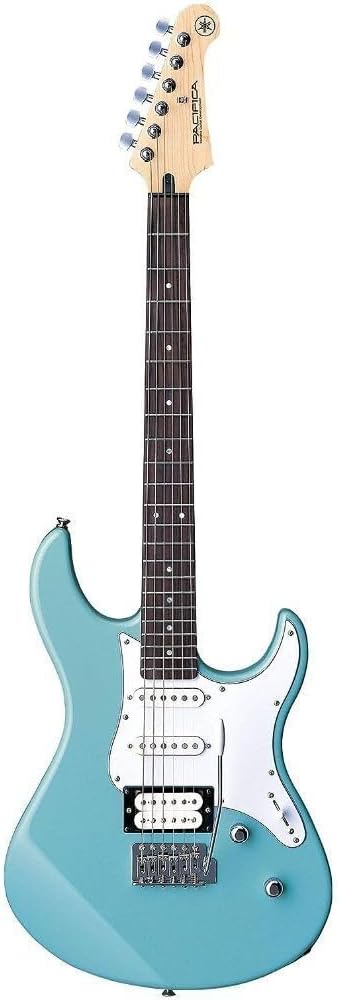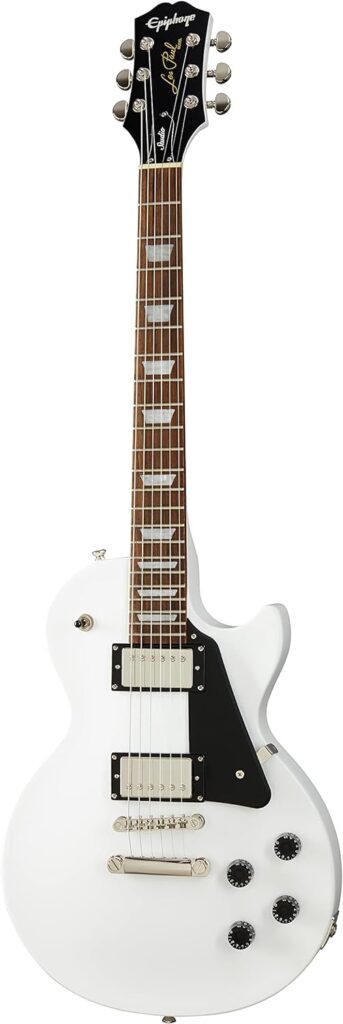Introduction
The electric guitar is not just an instrument; it’s a symbol of musical revolution. With over 2.5 million electric guitars sold annually in the U.S. alone, it’s clear that this versatile instrument continues to capture the imagination of musicians worldwide. Whether you’re a beginner eager to strum your first chords or a seasoned player looking to upgrade your gear, finding the right electric guitar can be a daunting task. With countless options on the market, each offering unique features and styles, it’s essential to choose one that resonates with your musical aspirations. In this guide, we’ll dive deep into the best electric guitars available today, ensuring you have all the information you need to make an informed decision. So, whether you’re looking for your first guitar or the perfect addition to your collection, keep reading to discover the top picks that stand out in 2024.
Best Electric Guitars
Best electric guitar for beginners
Electric guitar for metal
Best budget electric guitar
Versatile electric guitars
1. Fender American Professional II Stratocaster – Best for Versatility
The Fender American Professional II Stratocaster is an upgraded option for guitarists seeking unmatched versatility. This model represents the pinnacle of Fender’s craftsmanship, offering a blend of classic design and modern enhancements that make it a go-to choice for professional musicians. Whether you’re playing rock, blues, jazz, or any other genre, this Stratocaster adapts effortlessly, delivering a wide range of tones that suit any playing style.
Equipped with V-Mod II single-coil pickups, the American Professional II Stratocaster offers a bright, crisp sound that can easily transition from smooth, clean tones to gritty, overdriven sounds. The addition of a push-push tone control provides even more tonal options, allowing you to tap into new sounds without switching guitars. The neck profile, with its deep “C” shape and rolled fingerboard edges, ensures comfort during long playing sessions, making it an ideal choice for both lead and rhythm guitarists.
While the Fender American Professional II Stratocaster is an outstanding guitar, its price point might be steep for beginners or budget-conscious players. The high-quality materials and advanced features come at a cost, which could be prohibitive for those just starting out. Additionally, the single-coil pickups, while versatile, can still produce some hum at high gain settings, which might not be ideal for players who frequently use heavy distortion.
Pros
- V-Mod II pickups deliver a versatile tone suitable for various genres.
- Comfortable deep “C” neck profile with rolled fingerboard edges.
- High-quality build and modern features suitable for professional use.
Cons
- Higher price point may not be accessible for beginners or budget-conscious players.
- Single-coil pickups may produce hum in high-gain settings.
- Advanced features might be overwhelming for new players.
2. Ibanez RG450DX – Best for Shredding
The Ibanez RG450DX is a favorite among guitarists who thrive on speed and precision. Known for its slim neck and fast action, this guitar is designed for those who love to shred. Whether you’re playing lightning-fast solos or complex riffs, the RG450DX provides the speed and comfort you need to push your limits. Ibanez has long been associated with the shredding community, and the RG450DX is a testament to that legacy.
Featuring a solid basswood body, a Wizard III neck, and 24 jumbo frets, the RG450DX offers unparalleled playability, especially for metal and hard rock enthusiasts. The Wizard III neck is particularly noteworthy for its slim, flat profile, allowing for quick hand movement across the fretboard. The double-locking tremolo system allows for extreme dive bombs and pitch shifts without sacrificing tuning stability, making it a reliable choice for aggressive playing styles. Whether you’re a fan of metal, progressive rock, or any genre that demands technical prowess, the RG450DX is built to handle it all.
While the Ibanez RG450DX excels in fast playing, its tonal range might not satisfy players who need versatility across multiple genres. The guitar’s pickups, while great for high-gain settings, can lack the warmth and clarity needed for clean tones. This can be particularly noticeable when switching from a heavy distortion to a clean channel, where the pickups may not deliver the same level of detail. Additionally, the double-locking tremolo system, though effective for keeping the guitar in tune during heavy use, can be tricky to set up and maintain, especially for beginners. The complexity of the system might require regular maintenance or professional adjustment to ensure it performs optimally.
Pros
- Slim Wizard III neck ideal for fast playing, allowing for quick transitions between notes.
- 24 jumbo frets for extended range and ease of play, perfect for soloing.
- Double-locking tremolo system ensures tuning stability during heavy use, even with extreme pitch bends.
Cons
- Limited versatility for genres outside of metal and hard rock, as the pickups may not deliver warm clean tones.
- Pickups may lack warmth and clarity on clean settings, especially when compared to more versatile models.
- Tremolo system setup can be challenging for beginners, requiring frequent maintenance to stay in top condition.
3. Epiphone Les Paul Standard '50s – Best for Classic Rock
The Epiphone Les Paul Standard ’50s is a fantastic alternative for those seeking the classic Les Paul sound at a more affordable price. This model captures the essence of the legendary 1950s Les Paul, known for its rich, warm tones and exceptional sustain. Whether you’re into classic rock, blues, or even jazz, this guitar delivers the iconic sound that has shaped these genres for decades.
Featuring a solid mahogany body with a maple top, the Epiphone Les Paul Standard ’50s offers a well-balanced tone with plenty of warmth and depth. The ProBucker pickups, designed to mimic the original PAF humbuckers, provide a powerful output with a smooth, vintage character. The neck profile, inspired by the 1950s models, is rounded and comfortable, making it easy to play complex chords and fluid solos. This guitar is an excellent choice for players who want the classic Les Paul sound without the premium Gibson price tag.
While the Epiphone Les Paul Standard ’50s is an excellent choice for classic rock enthusiasts, it may not offer the same level of nuance and refinement as higher-end models. The guitar’s weight, typical of Les Pauls, might be uncomfortable during long playing sessions, especially for players not used to heavier instruments. Additionally, while the ProBucker pickups deliver a great vintage tone, they might not satisfy players looking for more modern or versatile sounds.
Pros
- Rich, warm tone ideal for classic rock and blues.
- ProBucker pickups deliver a powerful, vintage sound.
- Comfortable 1950s neck profile that suits various playing styles.
Cons
- Heavier weight may cause discomfort during long sessions.
- Limited versatility for modern genres.
- Lacks the refinement of higher-end models.
4. Squier Classic Vibe '50s Telecaster – Best for Vintage Tone
The Squier Classic Vibe ’50s Telecaster is a standout option for guitarists seeking the unmistakable twang and crispness of a vintage Tele. This guitar is a modern tribute to the original 1950s Fender Telecaster, a model that has left an indelible mark on country, blues, and rock music. Whether you’re playing a chicken-picking country lick or a gritty blues riff, the Classic Vibe ’50s Telecaster delivers the authentic sound and feel of a bygone era.
Modeled after the legendary 1950s Fender Telecaster, this guitar offers a combination of classic design and modern playability. It features an alder body with a vintage-tinted gloss neck, which not only enhances its retro appeal but also provides a smooth, comfortable playing experience. The custom single-coil pickups deliver that bright, cutting tone Telecasters are famous for, making it perfect for genres where clarity and articulation are key. The Classic Vibe ’50s Telecaster is an excellent choice for country, blues, and rock players who appreciate a retro aesthetic and sound. Its build quality, despite being a more affordable model, rivals that of higher-end guitars, ensuring that you get the best of both worlds—vintage tone and modern reliability.
While the Squier Classic Vibe ’50s Telecaster is a great entry into the world of vintage-style guitars, it may not satisfy players looking for a more modern sound or versatility. The single-coil pickups, while perfect for achieving that classic Telecaster tone, can be prone to noise, especially in high-gain environments. This is a common issue with single-coil pickups, which are known for their bright, clear sound but also their susceptibility to hum. Additionally, some players might find the neck profile a bit chunkier than contemporary models, which could affect comfort during longer playing sessions. Those accustomed to slimmer necks might need some time to adjust to this model’s feel.
Pros
- Authentic vintage tone with bright, cutting single-coil pickups, perfect for clean and crisp sound.
- Classic ’50s design with a retro aesthetic, appealing to fans of vintage guitars.
- Excellent build quality at an affordable price, making it accessible to players on a budget.
Cons
- Single-coil pickups may produce noise in high-gain settings, which can be distracting in live or studio environments.
- Limited versatility for modern genres, as it is primarily suited to vintage tones and styles.
- Chunkier neck profile may not suit all players, particularly those used to modern, slimmer necks.
5. Jackson JS32 Dinky – Best for Metal on a Budget
The Jackson JS32 Dinky is a formidable choice for metal enthusiasts who need a powerful guitar without breaking the bank. Jackson guitars have long been a staple in the metal community, known for their aggressive designs and heavy tones. The JS32 Dinky continues this tradition, offering features typically found in higher-end models at a budget-friendly price.
This guitar features a sleek, lightweight poplar body and a fast-playing maple neck with 24 jumbo frets, making it ideal for heavy riffs and rapid solos. The 24-fret design provides an extended range, allowing players to reach those high notes that are essential in metal solos. The high-output humbucking pickups provide the aggressive, punchy tones that metal demands, ensuring that your sound cuts through even the heaviest of mixes. These pickups are designed to handle high levels of distortion without losing clarity, making them perfect for genres like metal and hard rock. The double-locking tremolo system allows for dramatic dive bombs and sustained note bends without worrying about tuning stability. The JS32 Dinky’s sharp design and fierce sound make it an excellent option for metal players on a budget, offering performance that far exceeds its price point.
Despite its strengths, the Jackson JS32 Dinky has a few drawbacks. The build quality, while decent for the price, may not satisfy more discerning players, particularly in terms of hardware durability. The hardware, while functional, might not withstand the rigors of frequent gigging or intense practice sessions over time. The pickups, though powerful, might lack the clarity and articulation needed for more complex playing styles or genres outside of metal. For players who occasionally venture into other genres, this lack of versatility could be limiting. Additionally, the tremolo system, while effective for heavy use, can be difficult to set up and maintain, especially for beginners. The system’s complexity may require regular adjustments to maintain optimal performance, which could be challenging for those new to guitar maintenance.
Pros
- High-output humbuckers deliver aggressive metal tones, ensuring your sound remains powerful and clear.
- Fast-playing neck with 24 jumbo frets for ease of play, allowing for complex solos and fast riffs.
- Affordable price point for a quality metal guitar, making it accessible to beginners and budget-conscious players.
Cons
- Build quality may not satisfy more experienced players, particularly in terms of durability and hardware.
- Pickups may lack clarity for complex styles or other genres, limiting the guitar’s versatility.
- Tremolo system setup can be challenging for beginners, requiring frequent maintenance to ensure tuning stability.
Best Electric Guitars
Best electric guitar for beginners
Electric guitar for metal
Best budget electric guitar
Versatile electric guitars
6. PRS SE Custom 24 – Best for All-Around Performance
The PRS SE Custom 24 is a versatile guitar that balances quality, aesthetics, and playability, making it a favorite among guitarists of all genres. Paul Reed Smith (PRS) guitars are known for their impeccable craftsmanship and attention to detail, and the SE Custom 24 is no exception. Whether you’re playing rock, jazz, blues, or metal, this guitar can handle it all with ease.
Featuring a mahogany body with a maple top, this guitar is designed to deliver a wide tonal range, from warm, rich lows to bright, cutting highs. The mahogany body provides a solid, resonant foundation, while the maple top adds clarity and brightness to the overall tone. The 85/15 “S” pickups are a key highlight, providing clarity and punch whether you’re playing clean or with high gain. These pickups are designed to offer a versatile sound that can cover everything from smooth jazz tones to heavy rock crunch. With a 24-fret rosewood fingerboard and a comfortable wide-thin neck profile, the SE Custom 24 ensures smooth playability across the fretboard, making it suitable for everything from rock to jazz to metal. Whether you’re a lead player or a rhythm guitarist, this guitar adapts to your needs with ease.
Despite its versatility, the PRS SE Custom 24 may not satisfy players looking for a guitar with a specific tonal focus, such as the heavy crunch of a dedicated metal guitar or the twang of a classic Telecaster. While the 85/15 “S” pickups are designed for versatility, they may not excel in more specialized tones that some players require. Additionally, while the SE Custom 24 offers excellent build quality, it might not meet the standards of those accustomed to PRS’s higher-end models. The SE line is designed to be more affordable, and while it offers great value, it might not have the same premium feel as the core PRS models. The price point, while justified by its features, may also be a bit steep for beginners or those on a tight budget. For those just starting out, there are more affordable options that might be more appropriate before investing in a guitar like this.
Pros
- Versatile tonal range suitable for multiple genres, thanks to the 85/15 “S” pickups.
- High-quality build with a beautiful maple top, offering both aesthetics and durability.
- Smooth playability with a comfortable wide-thin neck, making it easy to navigate the fretboard.
Cons
- May not satisfy players looking for a guitar with a specific tonal focus, as it is designed for versatility.
- Build quality, while excellent, may fall short of higher-end PRS models, particularly in terms of premium feel.
- Price point may be too high for beginners or budget-conscious players, making it a better choice for those with more experience.
7. ESP LTD EC-1000 – Best for Heavy Rock and Metal
The ESP LTD EC-1000 is a top-tier guitar built for heavy rock and metal players who demand power, precision, and reliability. ESP guitars are renowned for their association with the metal genre, and the EC-1000 continues this tradition with features that cater specifically to the needs of rock and metal musicians. Whether you’re playing drop-tuned riffs or blazing solos, the EC-1000 delivers the performance you need.
This guitar features a mahogany body with a set-thru neck, ensuring sustain and resonance that are essential for heavier genres. The set-thru neck design not only enhances sustain but also provides easy access to the higher frets, making it ideal for lead players. Equipped with EMG 81/60 active pickups, the EC-1000 delivers a searing tone with incredible clarity and punch, perfect for cutting through dense mixes. These pickups are specifically designed for high-gain settings, offering a tight, aggressive sound that remains clear even at extreme levels of distortion. The 24 extra-jumbo frets on a smooth ebony fingerboard allow for effortless solos and aggressive riffing, making this guitar a favorite among professional metal musicians. The EC-1000’s sleek design, combined with its powerful sound, makes it a go-to choice for serious players looking to dominate the stage or studio.
While the ESP LTD EC-1000 excels in delivering high-gain, heavy tones, it may not be the best choice for players who need versatility across different genres. The active pickups, while perfect for metal, can sound too harsh or sterile in clean settings. This is a common characteristic of active pickups, which are designed to handle high output but may lack the warmth and dynamics of passive pickups in cleaner tones. Additionally, the guitar’s weight, typical of mahogany bodies, might cause discomfort during extended playing sessions. For players who are used to lighter guitars, the EC-1000 might feel cumbersome over time. The premium build and features also come at a higher price point, which may be prohibitive for beginners. For those just starting out or players on a budget, this guitar might represent a significant investment, which might be better suited to more experienced musicians.
Pros
- EMG 81/60 active pickups deliver powerful, clear tones for metal and rock, ensuring your sound cuts through any mix.
- Excellent sustain and resonance due to the set-thru neck and mahogany body, perfect for long, sustained notes.
- 24 extra-jumbo frets provide easy playability for fast solos, making it ideal for lead guitarists.
Cons
- Active pickups may sound too harsh for clean or softer tones, limiting the guitar’s versatility in different genres.
- Heavier weight could be uncomfortable during long sessions, particularly for players not accustomed to heavier guitars.
- Higher price point may not suit beginners or budget-conscious players, making it a better choice for experienced musicians.
8. Gretsch G2622 Streamliner – Best for Retro Vibes
The Gretsch G2622 Streamliner offers players a vintage-inspired design with modern playability, making it a perfect choice for those who love the retro sound and aesthetic. Gretsch guitars have a long history of producing instruments that capture the spirit of rockabilly, jazz, and blues, and the G2622 Streamliner is a continuation of that legacy. Whether you’re channeling the sounds of the 1950s or looking to add a unique flair to your modern playing, this guitar delivers both style and substance.
Another standout feature of the G2622 is its Bigsby-style tremolo, which adds a touch of vintage flair and allows for subtle pitch bends. This feature, combined with the guitar’s overall aesthetic, makes it a go-to option for players who value both sound and style. Whether you’re performing on stage or in the studio, the Gretsch G2622 Streamliner is sure to turn heads and deliver the tones you need.
While the Gretsch G2622 Streamliner excels in delivering rich, vintage tones, it might not be the best fit for players seeking more modern or aggressive sounds. The semi-hollow design, while great for resonance, can also be prone to feedback at higher volumes, making it less suitable for high-gain settings. Players who frequently use distortion or play at high volumes might find this guitar challenging to control in those environments. Additionally, the guitar’s size and shape may be uncomfortable for some players, particularly those used to solid-body guitars. The larger body can make it more difficult to handle during long sessions, especially for players with smaller frames.
Pros
- Vintage-inspired design with rich, resonant tone, perfect for jazz, blues, and rockabilly.
- Broad’Tron humbucking pickups deliver warm, full-bodied sound with versatile tonal options.
- Comfortable playability with a thin “U” neck profile, making it easy to navigate complex chord progressions.
- Bigsby-style tremolo adds a touch of vintage flair and allows for expressive pitch bends.
Cons
- Semi-hollow body prone to feedback at high volumes, limiting its use in high-gain settings.
- Limited suitability for modern or aggressive musical styles, as it is designed for vintage tones.
- Larger body size may be uncomfortable for some players, particularly those accustomed to solid-body guitars.
9. Yamaha Pacifica 112V – Best for Beginners
The Yamaha Pacifica 112V is widely recognized as one of the best electric guitars for beginners, offering exceptional value for money without compromising on quality. Yamaha has a reputation for producing reliable, high-quality instruments, and the Pacifica 112V is no exception. Whether you’re just starting out or looking for a solid, affordable guitar to add to your collection, the Pacifica 112V is a versatile option that can grow with you as you develop your skills.
This guitar features an alder body and a comfortable C-shaped maple neck, making it easy to handle for players just starting their musical journey. The alder body provides a balanced tone with a good mix of lows, mids, and highs, while the C-shaped neck is designed to be comfortable for most hand sizes, reducing the learning curve for new players. The versatile pickup configuration, with a humbucker at the bridge and two single-coils in the middle and neck positions, allows beginners to explore a wide range of tones, from warm blues to crunchy rock sounds. This HSS (humbucker-single-single) configuration offers the best of both worlds: the warmth and power of a humbucker with the clarity and articulation of single-coils.
The Yamaha Pacifica 112V also features a 5-way pickup selector switch, providing even more tonal flexibility. Whether you’re practicing at home, jamming with friends, or performing on stage, this guitar can handle it all. The tremolo bridge adds an extra layer of versatility, allowing for expressive playing, from subtle vibratos to more aggressive dive bombs. Overall, the Pacifica 112V is an all-around great choice for those who want a reliable, easy-to-play guitar that will grow with them as they develop their skills.
While the Yamaha Pacifica 112V is an excellent guitar for beginners, more advanced players may find its tonal range and build quality limiting compared to higher-end models. The stock pickups, while versatile, might lack the punch and clarity that more seasoned guitarists seek, especially in professional or recording settings. For players who have developed a more refined ear, these pickups might not deliver the level of detail and articulation needed for complex arrangements. Additionally, the tremolo bridge, though functional, may not hold tuning as well as more expensive systems during heavy use. Players who frequently use the tremolo might find themselves needing to retune more often, which can be a drawback during live performances.
Pros
- Exceptional value for beginners with versatile tone options, making it easy to explore different styles of music.
- Comfortable C-shaped neck that’s easy to play, reducing the learning curve for new players.
- Solid build quality for the price, ensuring the guitar will last as you progress in your playing.
- 5-way pickup selector offers a wide range of tones, enhancing the guitar’s versatility.
Cons
- Stock pickups may lack the depth and clarity needed by advanced players, limiting its use in professional settings.
- Tremolo bridge may not hold tuning as well during heavy use, which can be frustrating during performances.
- Limited tonal range compared to higher-end guitars, which might be a drawback for more experienced players.
10. Epiphone Les Paul Studio – Best for Professional Players on a Budget
The Epiphone Les Paul Studio offers professional-grade quality at a more accessible price, making it an excellent alternative to the higher-priced Gibson Les Paul Studio. This model retains the essential features that have made the Les Paul a staple in rock, blues, and jazz, but at a price that’s friendly for budget-conscious musicians. Whether you’re recording in the studio or performing on stage, the Epiphone Les Paul Studio delivers the tones and reliability you need.
This guitar features a solid mahogany body with a plain maple top, providing the rich, sustaining tones that Les Pauls are known for. The Alnico Classic PRO humbuckers deliver a versatile range of tones, from warm cleans to punchy overdriven sounds, making this guitar suitable for a variety of musical styles. The SlimTaper D-profile neck and Indian laurel fingerboard offer smooth playability, making it comfortable for extended playing sessions.
While the Epiphone Les Paul Studio offers great value, it may not satisfy players who prefer the premium feel and aesthetics of higher-end models. The guitar’s weight, though typical of Les Pauls, might be challenging for some during long performances. Additionally, while the Alnico Classic PRO pickups are versatile, they may not provide the same level of nuance and clarity as more expensive pickups found in higher-end models.
Pros
- Rich, sustaining tones with versatile Alnico Classic PRO pickups.
- Professional-grade build quality at a budget-friendly price.
- Smooth playability with a comfortable SlimTaper D-profile neck.
Cons
- Lacks the premium feel and aesthetics of higher-end models.
- Heavier weight can be tiring during long sessions.
- Pickups may not offer the same refinement as those in higher-priced models.
Buyer’s Guide: Choosing the Best Electric Guitar
In this comprehensive guide, we’ve explored a diverse range of electric guitars, each tailored to different playing styles, skill levels, and musical genres. From the versatile Fender Player Stratocaster to the powerful ESP LTD EC-1000, these ten guitars represent some of the best options available in 2024. Whether you’re a beginner just starting out, a seasoned professional, or somewhere in between, there’s an electric guitar on this list to meet your needs.
Key Considerations When Purchasing an Electric Guitar :
1. Playing Style and Genre :
Your preferred music genre should heavily influence your choice of electric guitar. For instance, if you’re into metal, consider guitars with high-output humbuckers like the ESP LTD EC-1000 or Jackson JS32 Dinky. These models are designed to handle the high-gain tones and aggressive playing styles common in metal and hard rock. On the other hand, if you’re after a vintage sound, the Squier Classic Vibe ’50s Telecaster or Gretsch G2622 Streamliner might be more suitable. These guitars are perfect for players who love the bright, articulate tones of country, blues, and rockabilly.
2. Skill Level :
Beginners may prioritize ease of play and value for money, making the Yamaha Pacifica 112V a strong contender. This model offers a versatile range of tones and a comfortable playing experience, making it an excellent choice for those just starting their musical journey. Meanwhile, advanced players might focus on build quality, tonal precision, and specific features, with options like the Gibson Les Paul Studio or PRS SE Custom 24 offering the performance and reliability needed for professional settings. These guitars are designed to deliver consistent, high-quality performance, whether you’re recording in the studio or performing on stage.
3. Budget :
Electric guitars vary widely in price, so it’s important to consider your budget when making a purchase. Beginners or budget-conscious players should consider affordable yet quality options like the Yamaha Pacifica 112V or Jackson JS32 Dinky. These models offer great value for money without compromising on essential features. For those willing to invest more, the Gibson Les Paul Studio or PRS SE Custom 24 offer professional-grade features and superior build quality. While these models come at a higher price point, they are designed to last and provide excellent performance over time, making them a worthwhile investment for serious players.
4. Build Quality and Durability :
The materials and construction of an electric guitar significantly impact its sound, durability, and overall feel. Mahogany bodies, like those found in the Gibson Les Paul Studio, provide rich tones but add weight, which can be a consideration for players who perform standing up for long periods. If you’re after a lighter guitar, models with alder or basswood bodies, like the Fender Player Stratocaster, might be preferable. These materials offer a good balance of tone and weight, making them comfortable to play while still delivering great sound quality.
5. Pickup Configuration :
The type and configuration of pickups are crucial in determining the sound of an electric guitar. Single-coil pickups, found in guitars like the Squier Classic Vibe ’50s Telecaster, deliver a bright, crisp tone but may produce hum, particularly in high-gain settings. These pickups are ideal for genres that require clarity and articulation, such as country and blues. Humbuckers, like those in the ESP LTD EC-1000, offer more powerful, noise-free output, ideal for heavier genres like metal and hard rock. Humbuckers are also versatile enough to handle a range of other styles, making them a popular choice for players who need a more robust, versatile sound.
6. Comfort and Playability :
Neck profile, fretboard radius, and overall weight affect how comfortable a guitar is to play, especially during long sessions. Slimmer necks, like those on the Ibanez RG450DX, cater to fast playing styles, making it easier to navigate complex solos and fast riffs. Meanwhile, chunkier necks, like those on the Squier Classic Vibe ’50s Telecaster, provide a more substantial grip that some players find more comfortable for rhythm playing. The weight of the guitar is also important—heavier guitars, like the Gibson Les Paul Studio, can provide better sustain and resonance but may be tiring to play for extended periods.
7. Aesthetics and Design :
The visual appeal of a guitar can also be a deciding factor, particularly for performers who want an instrument that reflects their style. If a classic or vintage look matters to you, options like the Gretsch G2622 Streamliner or Squier Classic Vibe ’50s Telecaster offer a timeless design that never goes out of style. These guitars not only sound great but also look the part, making them a great choice for players who value aesthetics as much as performance. On the other hand, modern designs like the Jackson JS32 Dinky offer a more aggressive look, perfect for metal players who want an instrument that complements their stage presence.
Final Thoughts :
Selecting the right electric guitar is a personal decision that should align with your musical goals, comfort, and budget. Whether you’re looking for a versatile workhorse that can handle any genre, like the PRS SE Custom 24, or a specialized instrument designed for a specific style, like the Jackson JS32 Dinky for metal, there’s a guitar out there that will meet your needs. By considering the factors outlined above, you can find a guitar that not only complements your playing style but also inspires you to grow as a musician. Whether you’re rocking out on stage, recording in the studio, or practicing at home, the perfect guitar is out there waiting for you—so take your time, try out different models, and find the one that speaks to you.
For more in-depth advice and product recommendations, be sure to check out all our buying guides at Resonance Manor. Whether you’re looking for guitars, amplifiers, or accessories, we’ve got you covered!
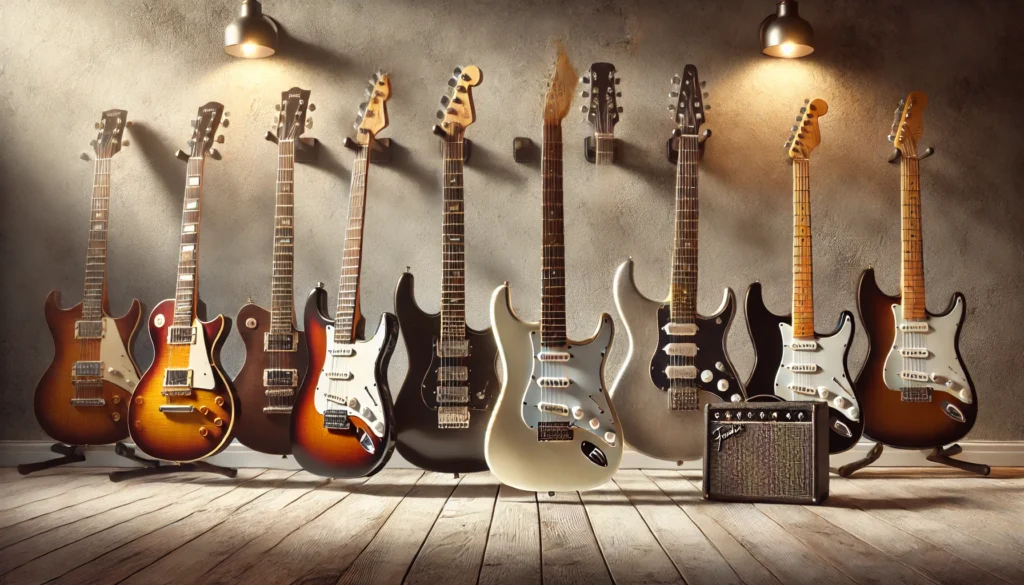
Best Electric Guitars
Best electric guitar for beginners
Electric guitar for metal
Best budget electric guitar
Versatile electric guitars
Best Electric Guitars
Best electric guitar for beginners
Electric guitar for metal
Best budget electric guitar
Versatile electric guitars
Best electric guitar for beginners
Electric guitar for metal
Best budget electric guitar
Versatile electric guitars
Best electric guitar for beginners
Electric guitar for metal
Best budget electric guitar
Versatile electric guitars
Best electric guitar for beginners
Electric guitar for metal
Best budget electric guitar
Versatile electric guitars
Best electric guitar for beginners
Electric guitar for metal
Best budget electric guitar
Versatile electric guitars
Best electric guitar for beginners
Electric guitar for metal
Best budget electric guitar
Versatile electric guitars
Best electric guitar for beginners
Electric guitar for metal
Best budget electric guitar
Versatile electric guitars
Best electric guitar for beginners
Electric guitar for metal
Best budget electric guitar
Versatile electric guitars
Best electric guitar for beginners
Electric guitar for metal
Best budget electric guitar
Versatile electric guitars


